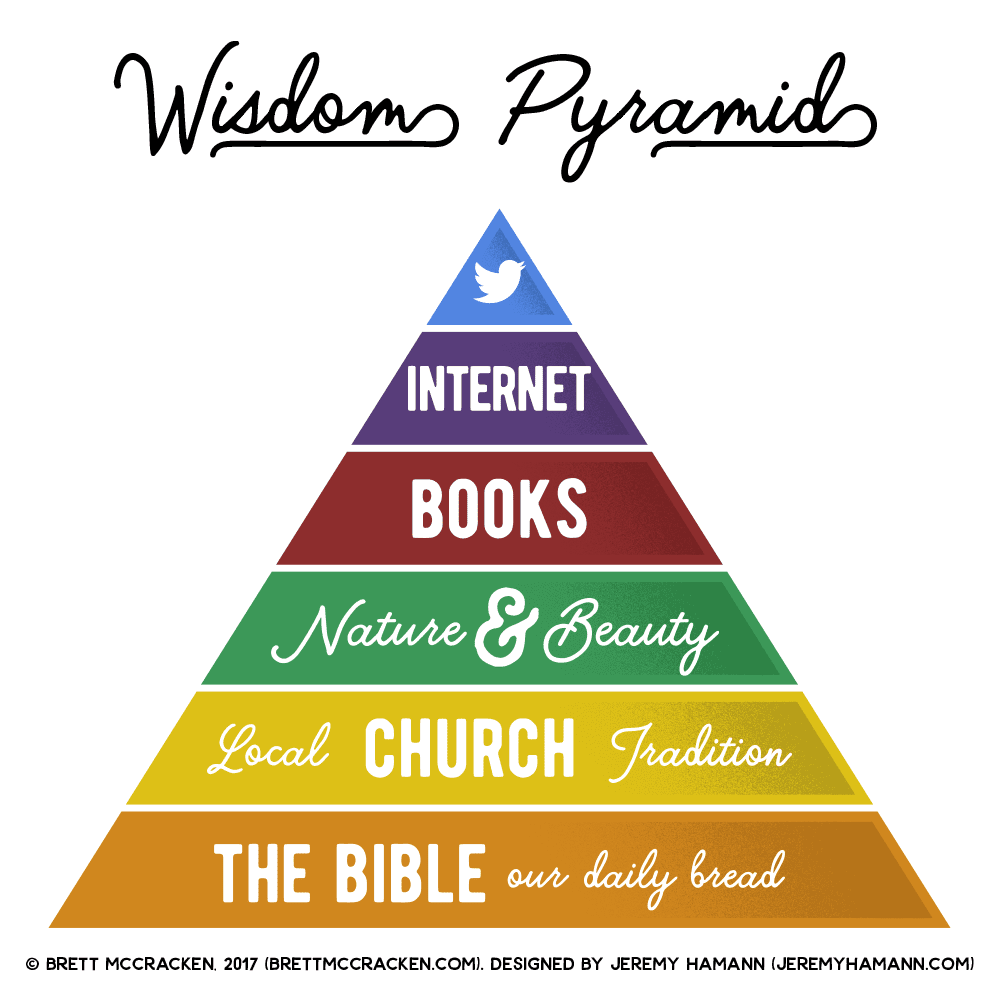
Editor’s Note: To start our New Year, we’re going to be taking an in-depth look at author Brett McCracken’s proposed “Wisdom Pyramid.” Over the course of six days, we’ll look at the roles that the Bible, the church, nature and beauty, books, the internet, and social media play in our lives.
Day Four
Books
Some people just love buying, collecting, and discussing books. But a recent study by the Pew Research Center shows that 26% of adults in the United States haven’t read a single book, in any format, in a year. That’s more than a quarter of the population!
We read our texts, emails, magazines in the doctor’s office, and posts on social media, but often not books. Perhaps it’s because we don’t know what to read, or they’re too bulky, or seem too long. But maybe we need to try.
We grow in wisdom when our attention is forced to extend beyond 280 characters. We harness our attention, will, and self-discipline when we commit to walk along with an author for hundreds of pages, learning the genesis, development, and application of their ideas. Reading books both relaxes and stretches our thinking. Psychology Today reports that “becoming engrossed in a novel enhances connectivity in the brain and improves brain function. Interestingly, reading fiction was found to improve the reader’s ability to put themselves in another person’s shoes and flex the imagination in a way that is similar to the visualization of a muscle memory in sports.”
When we forgo reading books, we are missing out on opportunities for wisdom.
 Questions:
Questions:
- How many books do you read a year? Do you spend more time reading books or hanging out on social media? Do you read books more or less often than you read the Bible?
- Do the books you choose to read increase your wisdom and understanding? Are you reading to escape, or to inform? How could you find a good balance?
- What books are missing in your reading history and your current library? Do you read books written by people of color, about something other than being a person of color? Do you read both cross-cultural classics and new releases? Do you read books about theology? Do you read authors you know you won’t agree with?
- What are the people you respect reading?
Next Steps:
- If your device is always with you, consider putting books on your device. Classics and new releases are available to download and can be as accessible as our social media. Consider adding reading apps to your phone and tablets; apps like Goodreads allow you to set reading goals and track your progress
- Gene Luen Yang, the National Ambassador for Young People’s Literature, has three guidelines for selecting books to broaden your horizons: Read a book about a character who doesn’t look like you or live like you, read a book about a topic you don’t know much about, and read a book in a format that you don’t normally read. Maybe the next book you buy, download, or check out from the library could be written by a person of color, a woman in power, or a long-gone mystic.
- Challenge yourself to read a book by and/or about a person with whom you do not agree. Consider tackling an opposing political view, or a different religion. Make a list of questions as you read, and then find a real live person to ask and learn from with humility and respect.
- Find out what the people you respect are reading. Ask leaders at your local church what books they recommend. Go to the blogs of the teachers and influencers you admire and write down the books that shaped their thinking, and the books they are writing.
- CSA recently published a recommended reading list if you’re looking for a place to start!
Tomorrow’s wisdom quest topic might make you uncomfortable, as we’re going to talk about how you use the internet. Maybe today is a good day to curl up with a good book in preparation!
Aimee Fritz delights in telling long, true stories about compassion, souls, and big mistakes among the everyday absurdities of her suburban life. Long ago she consulted companies, churches, and nonprofits. Now she runs Family Compassion Focus to funnel all that into helping people become lovable and loving World Changers. She recently co-wrote the Family Toolkit (free download) for Kent Annan’s Slow Kingdom Coming: Practices for Doing Justice. Loving Mercy, and Walking Humbly in the World (IVP). To arrange a meeting, a talk, or an article, contact Aimee via e-mail (familycompassionfocus@gmail.com).


